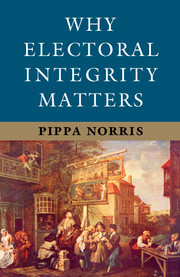Book contents
- Frontmatter
- Contents
- List of Figures
- List of Tables
- Preface and Acknowledgments
- Part I Introduction
- Part II The Problem of Flawed Elections
- Part III The Consequences of Electoral Integrity
- 6 For Legitimacy
- 7 For Political Behavior
- 8 For Conflict and Security
- 9 For Regimes
- Part IV Conclusions
- Technical Appendix A: Description of Variables and Scale Construction
- Technical Appendix B: Questions in the Expert Survey of Perceptions of Electoral Integrity
- Technical Appendix C: Electoral Context and Background in the Selected Cases
- Notes
- Select Bibliography
- Index
8 - For Conflict and Security
Published online by Cambridge University Press: 05 July 2014
- Frontmatter
- Contents
- List of Figures
- List of Tables
- Preface and Acknowledgments
- Part I Introduction
- Part II The Problem of Flawed Elections
- Part III The Consequences of Electoral Integrity
- 6 For Legitimacy
- 7 For Political Behavior
- 8 For Conflict and Security
- 9 For Regimes
- Part IV Conclusions
- Technical Appendix A: Description of Variables and Scale Construction
- Technical Appendix B: Questions in the Expert Survey of Perceptions of Electoral Integrity
- Technical Appendix C: Electoral Context and Background in the Selected Cases
- Notes
- Select Bibliography
- Index
Summary
One of the most remarkable developments during our lifetimes has been the global diffusion of competitive elections. As noted in Chapter 4, by the end of World War II, fifty nations had multiparty contests for the lower house of parliament; today, elections are almost universal worldwide; only a few states, mainly Gulf state monarchies, have appointed assemblies. Elections are organized in risky and difficult environments, including as a standard part of peace-building operations and negotiated settlements in deeply divided societies wracked by decades of conflict and among poor and illiterate populations. In this context, electoral processes are designed to determine initial control of state institutions and to strengthen the popular legitimacy of the new authorities. During the 1990s, the United Nations organized or observed landmark elections and popular consultations in Timor-Leste, South Africa, Mozambique, El Salvador, and Cambodia. More recently, the UN has provided crucial technical and logistical assistance in breakthrough elections as part of the peace-building process in many countries, including Afghanistan, Burundi, the Democratic Republic of the Congo (DRC), Iraq, Nepal, Sierra Leone, and Sudan. Following the collapse of authoritarian regimes, contests were organized in post-Ben Ali Tunisia (2011) and post-Gaddafi Libya (2012).
Under these challenging conditions, perhaps not surprisingly, many contests start with hopes, but end with a flurry of court disputes, a flood of street protests, and outbreaks of conflict. In 2013 alone, opposition forces claimed fraud and challenged the legitimacy of the outcome following contests in Malaysia, Venezuela, Mozambique, Cameroon, Uganda, Zambia, Cambodia, and Pakistan. In many cases, popular protests gradually faded away. In others, discontent triggered bloodshed. Conflict is not an isolated occurrence; during the last decade, NELDA estimates suggest that almost one-fifth of all elections were afflicted by electoral violence involving at least one civilian fatality. The number of cases has risen sharply; during the last two decades, deadly violence occurred in approximately 294 national elections, or roughly one contest per month. The extent of conflict can be measured in different ways and this indicator provides a fairly conservative estimate since the count excludes problems of violent harassment, intimidation, and threats that do not end with civilian death. Conflict that occurs at any stage of the electoral cycle signals perhaps the most obvious breakdown of legitimate contests, raising widespread concern among the international community and local stakeholders.
- Type
- Chapter
- Information
- Why Electoral Integrity Matters , pp. 145 - 168Publisher: Cambridge University PressPrint publication year: 2014



